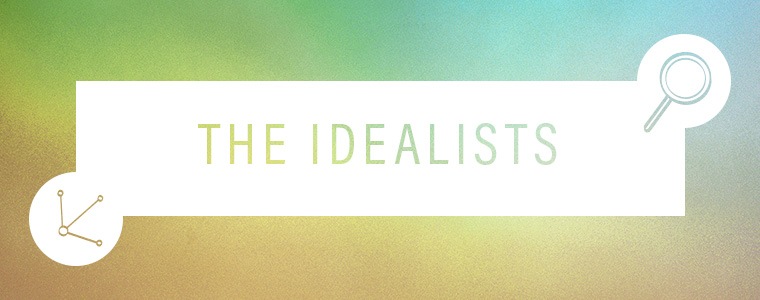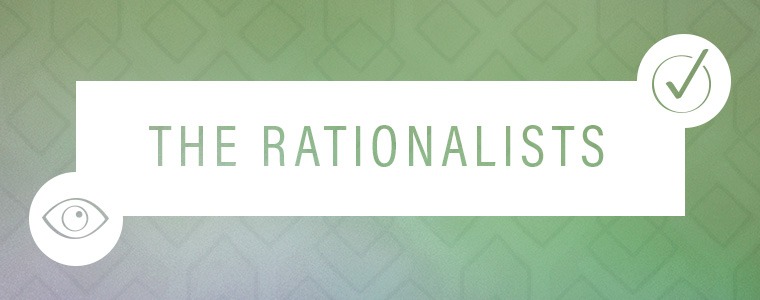The Best Way to Manage Stress for Your Myers-Briggs Personality Type
Americans are in serious need of a vacation (salt cave date, anyone?). According to the American Psychological Association, 80 percent of Americans experienced symptoms related to stress—such as headaches, feeling overwhelmed, or feeling depressed—in the past year. Whether it's work, money, or family issues keeping you up at night, it's clear that the daily grind can have a serious effect on your health.
But curing stress isn't as easy as clicking your heels and saying "work-life balance" three times (if it was, we'd all be as happy as Norwegians). Everyone handles pressure differently, and certain personalities might be more prone to anxiety, obsessive rumination, or rigid thinking. But if you know your Myers-Briggs type (if you don't, read this and come back), you may be one step closer to a restful mind and nights of sound sleeping.
Keep reading to learn the best stress management tactics for your Myers-Briggs personality type.

ISTJ: Learn from your past
You tend to have a keen memory, which totally comes in handy in your cardio dance class—less so when you're confronted with a scenario that's caused you stress in the past. When this happens, you tend to dwell on those old feelings of sadness, despair, and frustration. Recalling a past problem can be a great tool, but only if you use that memory to learn from your mistakes and handle things differently this time around.
ISFJ: Talk to someone you trust
You tend to work yourself up by overanalyzing things you have no control over—why is your friend acting distant? Is it something you said? To snap yourself out of your cycle of self-doubt, you need someone else’s perspective. Open up to a person you fully and completely trust. Getting feedback will help you understand exactly what’s bothering you and whether there's anything you can do to fix it.

{{post.sponsorText}}
ESFJ: Practice self-care
You have a tendency to people-please without stopping to think about what’s fair and healthy for yourself. Sometimes, you can become so focused on making others happy that you start to think you can always do more. In reality, you're stretched too thin already. When you’re feeling overwhelmed, it’s often a time to step back and consider your actions. First, try giving yourself some space and focus on self-care rituals like meditation, healthy eating, and exercise. If you’re still feeling stressed, consider your relationships. If anyone in your life is asking too much of you—and returning very little support—it could be time to see less of them. To give back to others, you need to keep your own energy tank full.
ESTJ: Pump the brakes
Usually, you’re great at acting rationally. When you're pulled in too many directions...not so much. Whether you’re trying to work on too many projects at once or spending every night of the week at a new exercise class/networking event/date, your full schedule can make you feel overstimulated and unproductive. In order to calm down, you need to stop and consider: What time-management methods have worked for you in the past? What are your priorities right now? These two questions should help you figure out how you should organize your to-do list to get things done as effectively and efficiently as possible.

ESFP: Remember why you’re doing what you’re doing
ESFPs are natural doers, but you veer into unhealthy territory when you get overly results-focused. You can miss the forest for the trees, becoming demanding and confrontational in an attempt to get things done. In reality, you operate best when you’re in touch with how your actions are furthering your values: You're motivated by the ability to make others feel better, loved, and accepted—not to be able to coldly check a box. Remembering the “why” component of your actions should naturally help you add patience back into your life, and loosen your grip on those reins.
ESTP: Find purpose and speak your mind
ESTPs are one of the most laid-back types, so stress may not impact you in an obvious way. Although you seem like an independent rebel, you’re actually a people-pleaser by nature. Arguments make you uncomfortable, so you smooth problems instead of fixing them. However, when you're constantly bending to others' whims you can start to feel taken advantage of. This may spur you to act out (are you picking fights with your S.O. or spending a few too many nights out until last call?) just to feel noticed or get a rise out of someone. You might prefer to go with the flow instead of stating your deeper feelings, but it’s high time you speak up. When you’re clear about what you need, others know how to respect your space and wishes.
ISTP: Do, do, do
A stressed-out ISTP can appear crippled in their ability to act effectively, which is the complete opposite of your healthy, “doer”-oriented state of being. You might start to break down every problem that comes your way in an attempt to understand the root of the issue. But for you, understanding serves no purpose without action attached, and action helps you to better implement a vision. If you’ve been stuck at a desk job or cooped up inside for too long, it’s important to feed that go, go, go nature. Take an impromptu vacation, get back into an active hobby like running, or work on a tangible project (take apart an engine or cook a complex meal—technical work is where your mind thrives). Chances are, getting your hands dirty or detaching from your day-to-day life will kill all that rumination.
ISFP: Find your outlets
ISFPs are creative and artistic souls, which means you absolutely need an outlet for all your emotions. When that charged energy has nowhere to go, you are prone to letting your emotions and worries get the best of you. Sometimes, you can even catastrophize about how your future might play out and feel unable to make spontaneous decisions—something you normally have no problems with. Set aside time to play an instrument, paint a mural, dance, write a poem, or even pen a letter to express how you feel. Having a physical way to release your emotional stress will help you regain a sense of balance.

ENFP: Focus on one goal at a time
ENFPs like to explore the world as actively as they can; you’re an energetic and empathetic person who entertains ideas as they pertain to your personal values and missions. Sometimes, though, you can get too excited about ideas, biting off more than you can chew as you start multiple projects at once. This lack of focus causes you to spin your wheels, leaving you frustrated by the lack of hard results. Really, your best bet for balance and fulfillment is to focus on one passion at a time. Possibilities are more rewarding when they’re contained and furthering a goal, not when they’re totally endless and hard to manage.
INFP: Let go of the past by exploring new possibilities
You tend to idealize as an INFP, and sometimes that idealization reaches way back—you can't help but scroll through your own Instagram feed to reminisce about college life or an ex. You tend to remember your past as better than it actually was, and dwell on the choices you made that led you to where you are today (which is stressed, sad, and listless). To break free from this cycle, you need to explore possibilities again. Take a trip, go on dates with new people, meet new friends, or change up your style. Life doesn’t have a do-over button, and that’s okay. You can still move forward, grow stronger in your decision-making, and find fresh reasons to be excited.
INFJ: Connect with others
INFJs are both introverted and focused on others, which means you need to strike a unique balance in your life. However, if you're experiencing a lot of work stress or relationship drama, it can be easier for you to withdraw from others. And when you do crawl into your cave, you have a tendency to overanalyze the problem from a purely rational perspective and stop considering others’ feelings. Although it goes against your introverted instincts, it’s super important to be social when you’re stressed out. Not only can you get feedback to help you find the best way forward with your problems, but you just feel better when you’re balancing alone time with human interaction.
ENFJ: Take a step back
ENFJs love to be around people, and they also love to be helpful. Too often, however, you spend an inordinate amount of time and energy on others. You run yourself ragged trying to make sure everyone in your life feels comforted, cared for, accommodated, and fulfilled, while at the same time seeking constant validation from friends and family. You might overindulge on glitzy, impulsive purchases to prop up your image, instead of finding inner peace and satisfaction. When this happens, take a day off. Meditate. Participate in self-care rituals. Bar yourself from contact with friends. Perspective helps you remember who you are, what you want in life, and how to make it happen.

INTJ: Check things off your to-do list
INTJs are visionaries by nature, but you can sometimes go too far in trying to anticipate how your whole life will play out—you might worry about whether your kids have enough structure to become thriving adults (even though they're still in diapers) or if this date could possibly be your future spouse. When one or two small things seem wrong, you start to imagine everything else will go wrong, too. You might second-guess yourself, wallow in negativity, or forget to actually get out there and try. To build your confidence back up again, focus on execution. Create a plan or make a to-do list, and actively check items off it. If your vision doesn’t lead to real-world action, you’ll dwell on what could go wrong instead of see how much can go right. And always remember: It’s okay to fail if you learn from it.
INTP: Break apart your problem
You're future-oriented, so it can be a problem if you get mired in the past. If you experience a problem twice, like a breakup or a stalemate at work, you may start to feel hopeless and think “this is simply how the world works.” Whenever you’re experiencing limiting beliefs in your ability to break through a barrier, it’s important to explore new possibilities and “what if” scenarios. Deconstruct the breakup; find out when you started to sense a problem and how you might have been a more supportive partner. Call a meeting of the minds to discuss a complicated problem at the office, so you can all mentally explore possible solutions. Break apart the issue so you can try putting it back together in a new way.
ENTP: Use critical thinking
ENTPs soak up their external environments. You like to imagine possibilities and interact with as many new people as you can; it’s how you learn and grow. That said, when you let those interactions run amuck in your mind, your imagination can go wild with worries. When you’re feeling sensitive to others’ feedback and stressed out by the future, you need to turn inward: Logic and analysis can help you break away from toxic spirals. Start passing feedback under a critical microscope. If you’re concerned that your work project might not get done in time, ask yourself what steps you will need to take to make sure your goals are met. If someone argues with one of your ideas, ask yourself how you can utilize their feedback—or if they might be wrong.
ENTJ: Tap into your vision
Perhaps the most capable of all the personality types, you can often get lost in meaningless competition under stress. You become relentless in your pursuit of results, instead of making decisions to further a goal. Your commanding personality will turn into a domineering one, grasping at power and control instead of simply being the capable leader you normally are. Whenever you feel heavy, get back in touch with your inner guiding light. Are you focusing on reaching your goals in a way that’s true to your values and character, or simply pushing to be the most driven version of yourself? Are you trying to keep up with the Joneses, or are you setting goals that are reasonable and appropriate for you? Create a vision board, journal, or do some self-analysis to figure out where you might be able to trim the excess from your life.
No matter your personality type, you can try this technique to shake off stress in just 30 seconds. And cut this word from you vocabulary in order to feel less anxious.
Loading More Posts...